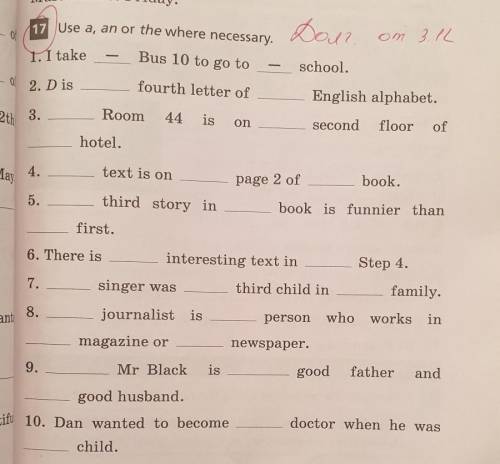O 17 use a, an or the where necessary. Dour
om 3.12
1. I take
Bus 10 to go to
school.
01
2. Dis
fourth letter of
English alphabet.
Ch 3.
Eh
Room
44
is
on
second
floor
of
hotel.
y.
text is on
page 2 of
book.
5.
third story in
book is funnier than
first.
6. There is
interesting text in
Step 4.
7.
singer was
third child in
family.
8.
journalist is
person who works in
magazine or
newspaper.
9.
Mr Black
is
good
father
and
good husband.
10. Dan wanted to become
doctor when he was
child.

Другие вопросы по теме Английский язык
Популярные вопросы
- Выпишите в две колонки : 1)слова с гласными,проверяемыми ударением...
3 - 1м-1см= 1дм: 5см= 1м: 2дм= 5дм: 2= 4м: 8=...
2 - Какое из данных чисел наименьшие? 1. 1/5 2. 2/9 3. 0,25 4. 0,3...
1 - Что больше: 1) 65 см или 1 м 2) 1 кг или 950 г 3)45 мин или 1 ч ответ...
3 - Для варки варенья из вишни на 6 кг ягод берут 4 кг сахарного песка....
2 - Предложение со словом набережные челны...
3 - Подобрать слова к схеме приставка корень суфикс окончание...
3 - Вперечне моделей укажите те , которые могут использоваться для: а) представления...
2 - 1.может ли луна наблюдаться с земли в созвездии тельца? в созвездии...
2 - Отметьте точкиаив.проведите прямую ав.отложите на этой прямой отрезокnm,равный...
1
- We use **the** before nouns that are specific or known to both the speaker and the listener. In this case, the speaker is referring to a specific bus route (Bus 10) and a specific school.
2. **The** fourth letter of **the** English alphabet is **C**.
- We use **the** before nouns when we are referring to a specific item within a category. In this case, the speaker is referring to a specific letter (the fourth letter of the English alphabet) which is known to both the speaker and the listener as "C."
3. **The** Room 44 is on **the** second floor of **the** hotel.
- We use **the** before nouns that are specific or known to both the speaker and the listener. In this case, the speaker is referring to a specific room number (Room 44), a specific floor (the second floor), and a specific location (the hotel).
4. **The** text is on **the** page 2 of **the** book.
- We use **the** before nouns that are specific or known to both the speaker and the listener. In this case, the speaker is referring to a specific text, a specific page number (page 2), and a specific object (the book).
5. **The** third story in **the** book is funnier than **the** first.
- We use **the** before nouns that are specific or known to both the speaker and the listener. In this case, the speaker is referring to a specific story (the third story), a specific book, and a specific comparison (funnier than the first).
6. There is **an** interesting text in **Step 4**.
- We use **an** before nouns that begin with a vowel sound. In this case, "interesting" starts with the vowel sound "i." The speaker is also referring to a general text and a specific step number (Step 4).
7. **The** singer was **the** third child in **the** family.
- We use **the** before nouns that are specific or known to both the speaker and the listener. In this case, the speaker is referring to a specific singer, a specific birth order (the third child), and a specific group (the family).
8. **A** journalist is **a** person who works in **a** magazine or newspaper.
- We use **a** before nouns that are general and not specific. In this case, the speaker is referring to journalists in general, not a specific journalist, magazine, or newspaper.
9. **Mr. Black** is **a** good father and **a** good husband.
- We use **a** before nouns that are general and not specific. In this case, the speaker is referring to Mr. Black as a general father and husband, not a specific one.
10. **Dan** wanted to become **a** doctor when he was **a** child.
- We use **a** before nouns that are general and not specific. In this case, the speaker is referring to Dan as a general person and child, not a specific one.